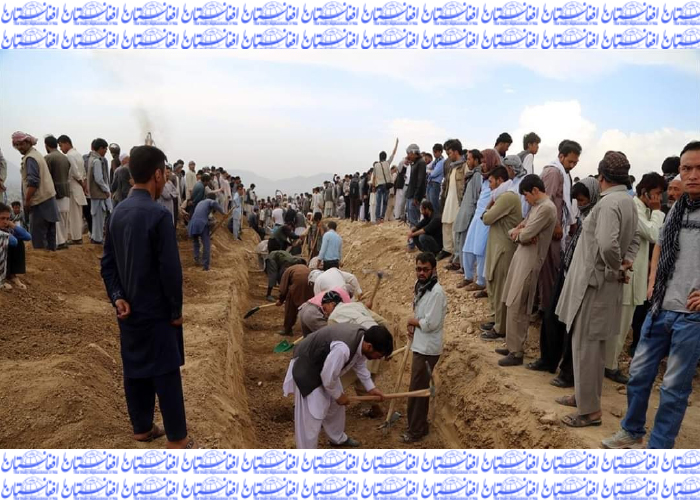After increase of Hazara massacre in recent years, the concept of Hazara genocide has become one of the hot topics in Afghanistan. The families of Sayeed Al Shohada School victims recently asked the government and international community to formally recognize Hazara genocide in Afghanistan. The families of the victims emphasize that they repeatedly and systematically targeted in this country, and so requested the international community and united nation to investigate the recent case through an independent international commission. Earlier, the Afghanistan Independent Human Rights Commission had also requested for an international investigations. Therefore, the question of Hazara genocide has become a serious question in Afghanistan. Are really Hazaras facing the crime of genocide in Afghanistan? What is the definition of genocide accordance with international laws?
In response to these questions, Hazara people, especially the families of victims believe that the latest deadly attacks are not the first attack and will neither be the last one in the country.
This inhumane terrorist attack has intentionally carried out in following previous systematic crimes which often targeted certain ethnic group which is Shia and Hazaras in Afghanistan.
This bloody and brutal crime is continued by targeting dozens of civilian facilities such as cultural and educational centers, mosques, clinics and maternity wards, wedding halls, sports clubs, peaceful demonstrations, and communication routes victimizing thousands of Hazara and Shia people in Afghanistan. People increasingly believe each of these bloody incidents was a clear example of genocide, crimes against humanity, and war crimes.
According to international laws and the Charter of the United Nations, the member states, international organizations, and the UN Security Council have a responsibility to fight against war crimes and crimes against humanity.
Most local experts say that the war crimes and other systematic crimes which are defined in Article 5 of the Statute of the International Criminal Court have happened in Afghanistan; especially it has frequently happened on Shia and Hazara people in Afghanistan. Accordingly, article 2 of the 1948 United Nations Convention on the Prevention and Punishment of the Crime of Genocide, defined it as any acts with intent to destroy, in whole or in part, a national, ethnic, racial, or religious group, as such: killing members of the group; causing serious bodily or mental harm to members of the group; deliberately inflicting on the group conditions of life, calculated to bring about its physical destruction in whole or in part; imposing measures intended to prevent births within the group; [and] forcibly transferring children of the group to another group.
Based on the above definition, there are two main elements in the identification of genocide: firstly, the deliberate will of annihilation, and secondly, targeting certain group. In regard to the first important element of genocide, there were some complexities in some cases of genocide that were taken place around the world, but in Afghanistan, both of the elements seem clearly materialized in the country. For example, Daesh has repeatedly announced to annihilate the Hazara race in Afghanistan. In the 1990s some of the Taliban members such as Abdull Manan Nayazi had loudly and formally announced a motto in Afghanistan that Tajik should go to Tajikistan, Uzbek should go to Uzbekistan but Hazara has no choice either go to the graveyard or become Sunni Muslim. Based on this mentality, a large number of Hazara civilians were killed in Mazar-e Sharif when initially entered the city in 1990s, and the same trend continued in the modern era with the presence of international community and a democratic government.
Unfortunately, the government of Afghanistan has not only failed in the identification, investigation, and punishment of the perpetrators in the past but also failed to prevent its reoccurrences in the future.
It is said that except for few cases of these crimes, the rest of the cases are still remaining open without any clear result and punishment of the perpetrators.
The unserious and careless approach of the government to these crimes has caused these bloody attacks to continue raising more concerns and questions in the country. On the other hand, the international community, humanitarian countries, and human rights organizations have not taken any serious and deterrent actions as was anticipated by the people of Afghanistan.
Therefore, the People criticize both government and international organizations as their actions were always confined to the issuance of a statement condemning the deadly events.
The international community and the US government should responsibly proceed in fighting against terrorism and the protection of oppressed civilians. The people ask the United Nations, and especially the esteemed members of the United Nations Security Council, not to be indifferent against these anti-human crimes and war crimes which often target Shia and Hazaras in Afghanistan.
The united nation especially the Security Council has moral and legal responsibilities to put pressure on governments for taking serious measures in the protection and security of defenseless citizens and also the identification and punishment of the perpetrators. The people also expect the international community, NATO, and the United States not to allow Afghanistan once again to change to a safe haven for the terrorist groups. People urge the government to seriously follow the issue of peace and war in the country. Some expert propose a comprehensive boycott on terrorist networks and their collaborators as putting more pressure on terrorists and their supporters are essential and vital to fight terrorism.
Identifying and justly punishing war criminals and crimes against humanity is an important step in this direction.
Home » Opinion » The Families of victims: Attack on Sayyid al-Shuhada school should be recognized as genocide
The Families of victims: Attack on Sayyid al-Shuhada school should be recognized as genocide
| Mohammad Zahir Akbari

